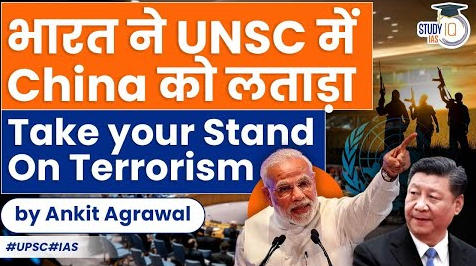Table of Contents

What has happened?
- India on Monday took a tacit swipe at China at the UN Security Council over issues such as “double standards” in fighting terrorism, coercive and unilateral action aimed at changing the status quo by force and respect for sovereignty and territorial integrity of states.
- In the backdrop of China-Taiwan tensions, India on Monday underscored that any “coercive or unilateral” action that seeks to change the status quo by force will undermine the common security.
- Though India’s envoy to the UN, Ruchira Kamboj, didn’t name any country while participating in a meeting at the Security Council on maintenance of international peace and security,
- It was obvious which country the remarks were referring to.

But why India said it?
- The meeting was convened at the behest of China, the president of the Security Council for August.
- The topic was on “Maintenance of International Peace and Security: Promote Common Security Through Dialogue and Cooperation”

What Kamboj said on common security?
- Kamboj noted that one of the guiding questions posed by the presidency for the meeting is what constitutes “common security”.
- “Any coercive or unilateral action that seeks to change the status quo by force is an affront to common security.
- Further, common security is only possible when countries respect each others’ sovereignty and territorial integrity, as they would expect their own sovereignty to be respected,”

- “Common security is also possible only if countries respect agreements signed with others, bilateral or multilateral, and do not take unilateral measures to nullify those very arrangements to those they were party to,” she added.
- The Indian side has repeatedly accused China of violating several agreements and protocols on border management by amassing troops along the LAC since early 2020.
- The standoff has taken bilateral relations to an all-time low.
Fight against terrorism
- “Common security is also only feasible when all countries stand together against common threats such as terrorism and do not engage in double standards while preaching otherwise,” Kamboj said.
- Over the past two months, China has blocked moves by India and the US to designate Lashkar-e-Taiba (LeT) leader Abdul Rehman Makki and Jaish-e-Mohammed (JeM) leader Abdul Rauf Azhar as global terrorists at the UN Security Council by using a “technical hold”.
- The moves were criticised by India.
Rule based order
- Kamboj said principles behind “common security”
- include upholding the rules-based world order underpinned by international law and based on respect for sovereignty and territorial integrity of all states,
- Resolution of international disputes through peaceful negotiations, and free and open access for all to the global commons.

- She said the world is facing multiple challenges such as terrorism, radicalism, threats from new and emerging technologies, climate change, pandemics, and intensifying geopolitical competition.
Cascading effect of war
- “An armed conflict in one part of the world has cascading effects on the people of another.
- We have seen the effect of the Ukraine conflict on other developing countries, particularly, on the supply of food grains, fertiliser and fuel.
- The impact of the crisis in Afghanistan is still being felt throughout the region,” Kamboj said.

- “At the same time, going into the third decade of this millennium, we need to ask ourselves, has the UN lived up to its expectations?
- The requirements and challenges of our present and future are vastly different from those of the past.
- The world today is very different from the world of 1945.
- Is the UN, particularly the Security Council which is the foremost organ tasked with the responsibility of maintaining international peace and security, able to remain relevant?”
- There should be a serious discussion on India’s call for reformed multilateralism, including the reform of the UN Security Council, Kamboj said.
- “How can we aspire for common security, when the
- common good of the global south is continued to be denied representation in its decision making,” she asked.
- A truly representative Security Council is the most pressingneed of the hour.
- Else, there is a real danger of the UN being superseded by other plurilateral and multilateral groupings which are more representative, more transparent and more democratic and, therefore, more effective
Q) With respect to the United Nations Refugee Convention 1951, which the following statements are correct?
- India is a member
- War criminals are not classified as refugees.
- It includes refugees from all countries
- 1 & 3 only
- 2 only
- 2 & 3 only
- 3 only
Latest Burning Issues | Free PDF






















 WhatsApp
WhatsApp